
Discover the Charm of Saint-Sauveur in La Rochelle
Saint-Sauveur is a delightful gem in the historic city of La Rochelle, France. This neighborhood offers a perfect blend of old-world charm and modern vibrancy. Its narrow, cobbled streets are lined with half-timbered houses and bustling cafes, each telling a story of centuries past. At the heart of Saint-Sauveur lies its namesake, the Saint-Sauveur Church. This ancient church, with its impressive architecture, is a must-visit. Nearby, you'll find the bustling market square, where local vendors sell fresh produce, artisanal cheese, and handmade crafts. It's a great place to soak in the local culture and taste some regional delicacies. Saint-Sauveur is also a hub for art and culture. The neighborhood is home to several galleries and museums, showcasing both contemporary and classical works. As you stroll through the streets, you'll encounter numerous street performers and musicians, adding to the lively and artistic atmosphere. Dining in Saint-Sauveur is an experience in itself. From cozy bistros to upscale restaurants, the neighborhood offers a variety of dining options. Don't miss the chance to try the seafood, which is a highlight of La Rochelle's culinary scene. Freshly caught fish, oysters, and mussels are served in many establishments, promising a delightful gastronomic journey.
Local tips in Saint-Sauveur
- Visit the Saint-Sauveur Church early in the morning to avoid crowds and enjoy a peaceful experience.
- Stop by the market square on weekends for the best selection of local produce and crafts.
- Wear comfortable shoes as the cobbled streets can be uneven and tiring to walk on.
- Make reservations for dinner, especially during peak tourist seasons, to ensure you get a table at popular restaurants.
Discover the Charm of Saint-Sauveur in La Rochelle
Saint-Sauveur is a delightful gem in the historic city of La Rochelle, France. This neighborhood offers a perfect blend of old-world charm and modern vibrancy. Its narrow, cobbled streets are lined with half-timbered houses and bustling cafes, each telling a story of centuries past. At the heart of Saint-Sauveur lies its namesake, the Saint-Sauveur Church. This ancient church, with its impressive architecture, is a must-visit. Nearby, you'll find the bustling market square, where local vendors sell fresh produce, artisanal cheese, and handmade crafts. It's a great place to soak in the local culture and taste some regional delicacies. Saint-Sauveur is also a hub for art and culture. The neighborhood is home to several galleries and museums, showcasing both contemporary and classical works. As you stroll through the streets, you'll encounter numerous street performers and musicians, adding to the lively and artistic atmosphere. Dining in Saint-Sauveur is an experience in itself. From cozy bistros to upscale restaurants, the neighborhood offers a variety of dining options. Don't miss the chance to try the seafood, which is a highlight of La Rochelle's culinary scene. Freshly caught fish, oysters, and mussels are served in many establishments, promising a delightful gastronomic journey.
Iconic landmarks you can’t miss
The Lantern Tower of La Rochelle
Explore La Rochelle's Lantern Tower, a historic landmark offering stunning views and a glimpse into the city's rich maritime heritage. A must-see for all tourists.
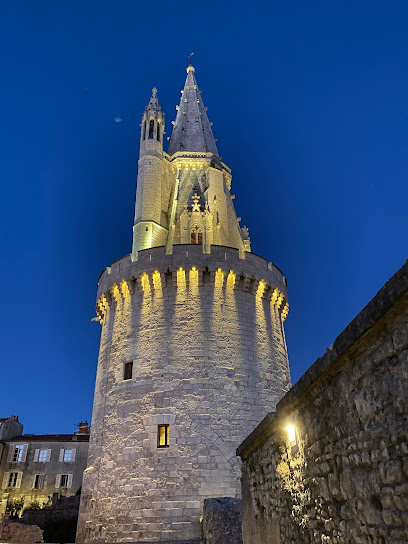
St. Nicholas Tower
Explore the imposing St. Nicholas Tower in La Rochelle, a medieval fortress with stunning city and ocean views, rich maritime history, and unique architecture.

Saint Louis Cathedral
Discover La Rochelle's Cathédrale Saint-Louis, a neoclassical architectural gem with a rich history dating back to the 18th century.
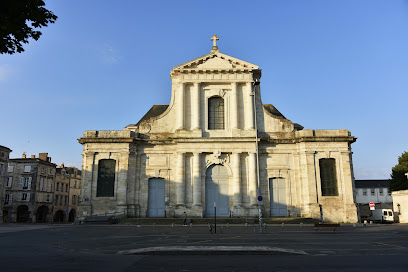
Saint Saviour Church of La Rochelle
Discover La Rochelle's resilient spirit at Saint Saviour Church, a blend of Gothic & Baroque architecture with a rich maritime history.
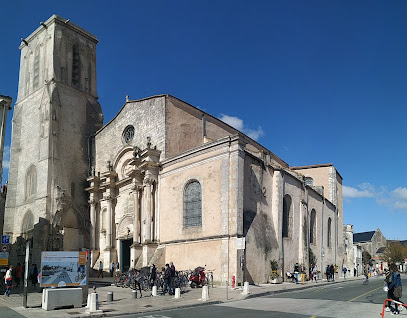
Grosse Horloge
Discover La Rochelle's iconic Grosse Horloge, a historic gateway blending medieval architecture with centuries of maritime heritage.
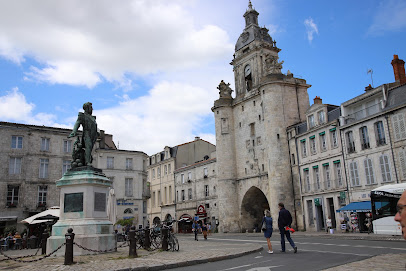
Cloister Of The White Ladies
Discover the Cloister of the White Ladies in La Rochelle: a historic abbey with stunning architecture, serene gardens, and captivating art exhibitions.
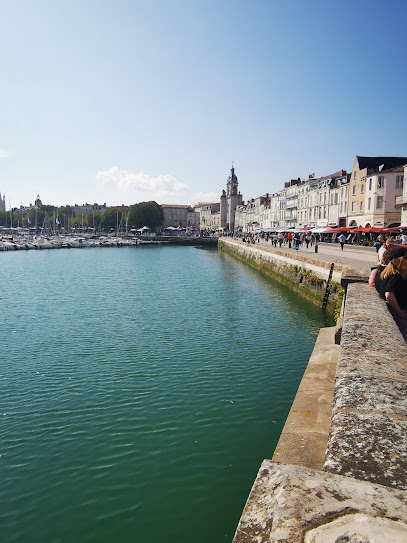
fontaine du Pilori
Discover the Fontaine du Pilori in La Rochelle: A historic fountain reflecting centuries of art and urban transformation.
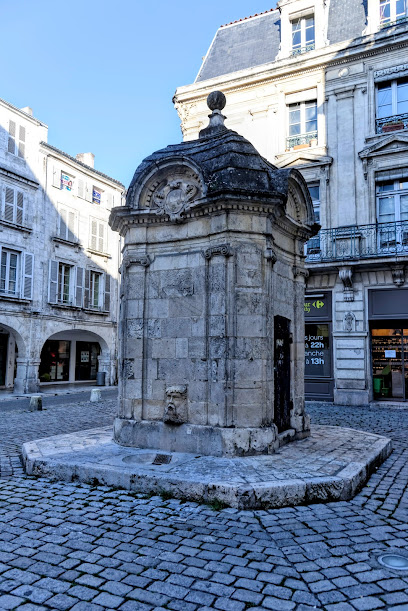
Clocher Saint-Barthélémy
A solitary Gothic bell tower, the last vestige of a destroyed church, echoing La Rochelle's history.
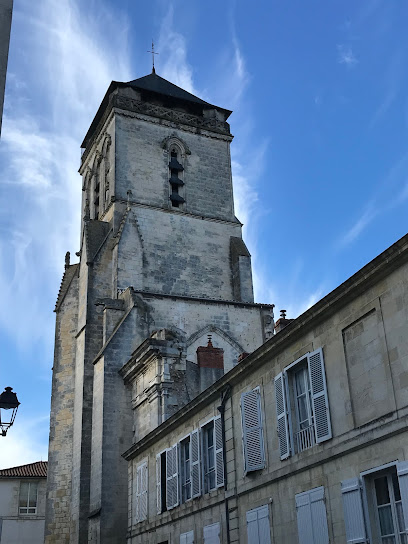
Big Clock Gate
Discover La Rochelle's iconic Big Clock Gate, a historic landmark bridging the old port and city center, showcasing centuries of maritime heritage.
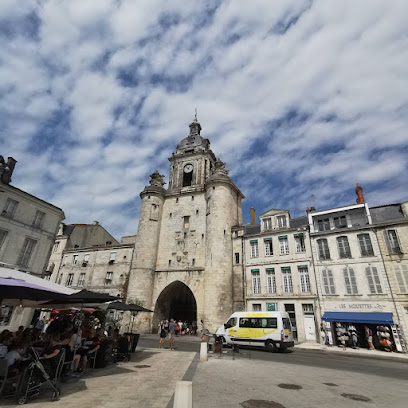
Place des petits bancs
Discover Place des Petits Bancs in La Rochelle: a historic square where medieval finance meets art and architecture.
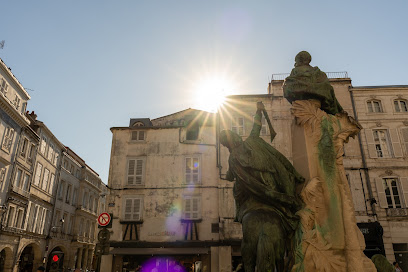
Unmissable attractions to see
La Rochelle Aquarium
Explore the fascinating underwater world at La Rochelle Aquarium, home to breathtaking marine life and engaging educational experiences.
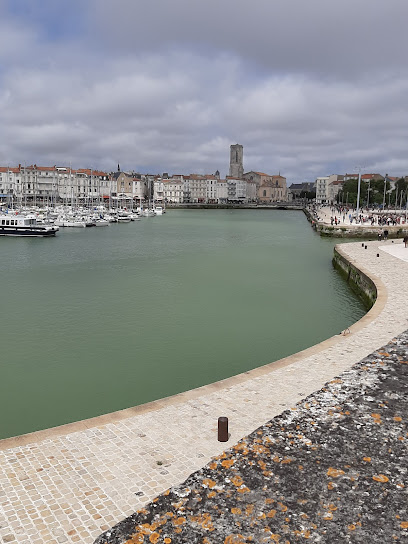
Charruyer Park of La Rochelle
Explore Charruyer Park, a lush oasis in La Rochelle, where nature and history intertwine for an unforgettable urban experience.
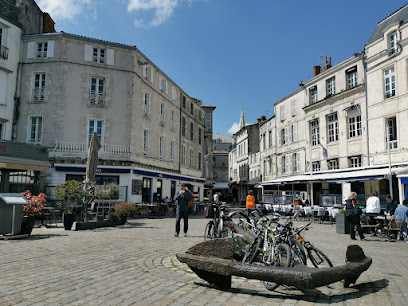
Musée Maritime de La Rochelle
Explore the rich maritime heritage of La Rochelle at the Musée Maritime, featuring historic vessels and interactive exhibits for all ages.
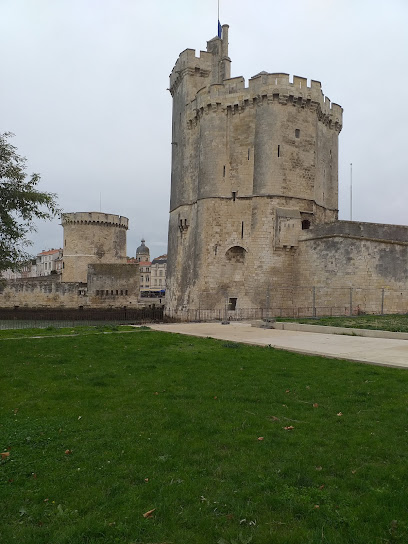
Bunker La Rochelle (Museum)
Immerse yourself in the fascinating history of La Rochelle at the Bunker La Rochelle Museum, a unique insight into wartime experiences.
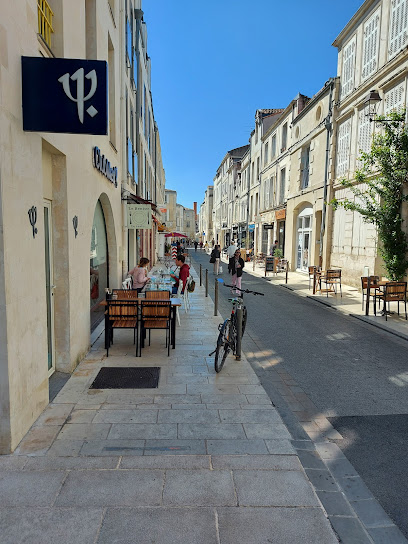
Muséum d'Histoire naturelle de La Rochelle
Explore the Muséum d'Histoire naturelle de La Rochelle, a natural history museum rich in exhibits and experiences for curious minds and families alike.
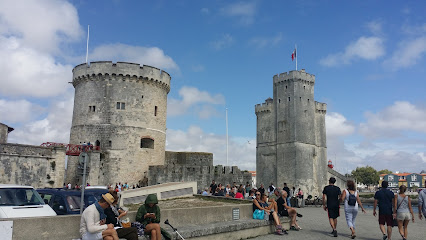
Saint Saviour Church of La Rochelle
Explore the architectural beauty and serene ambiance of Saint Saviour Church, a jewel in La Rochelle's cultural landscape, perfect for reflection and inspiration.
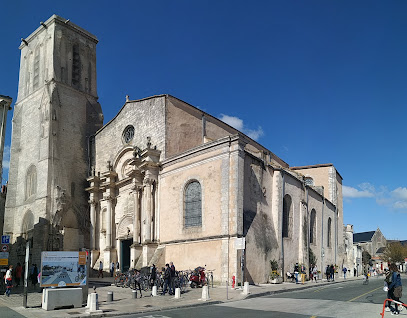
La Grande Roue de La Rochelle
Discover stunning views of La Rochelle from La Grande Roue, an iconic Ferris wheel offering a unique perspective of the city’s historic charm and coastal beauty.
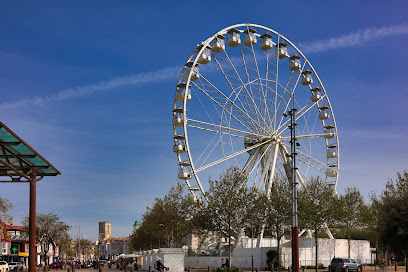
Les balades Z’urbaines de LR
Explore La Rochelle's vibrant history and culture through captivating urban walks that unveil the city's charm and stories.
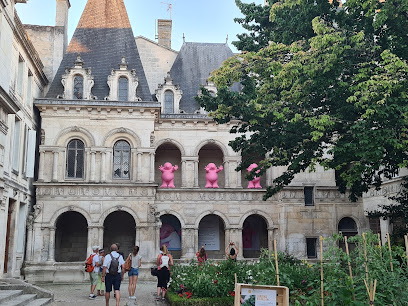
Essential places to dine
La Boussole
Experience the perfect blend of Asian fusion and French cuisine at La Boussole in La Rochelle - a must-visit for food lovers.
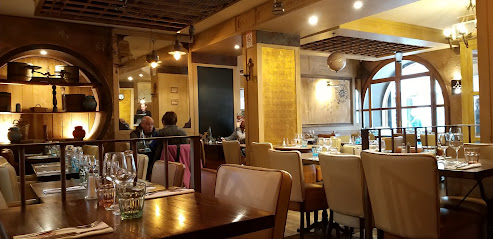
La Fleur de Sel
Experience exquisite French cuisine at La Fleur de Sel in La Rochelle – where culinary artistry meets local flavors.
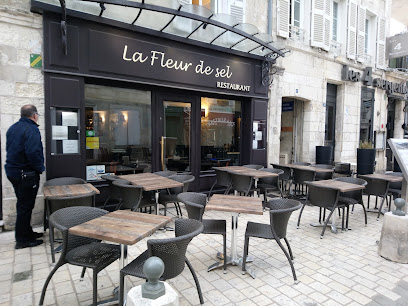
Les Fils à Maman La Rochelle
Discover delicious French cuisine and vibrant cocktails at Les Fils à Maman in La Rochelle – your perfect dining destination!
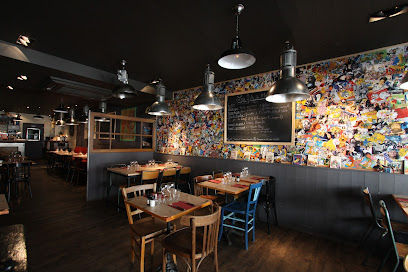
Le Bistrot Gourmand
Experience authentic French cuisine at Le Bistrot Gourmand in La Rochelle—where every dish tells a story.
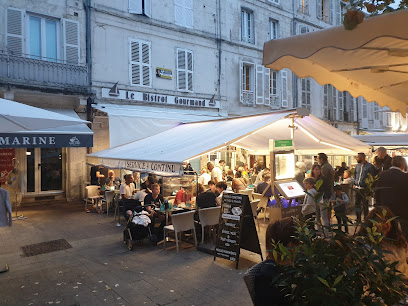
Restaurant Les Flots
Experience exquisite haute French cuisine at Restaurant Les Flots in La Rochelle—where every meal is a celebration of flavor and elegance.
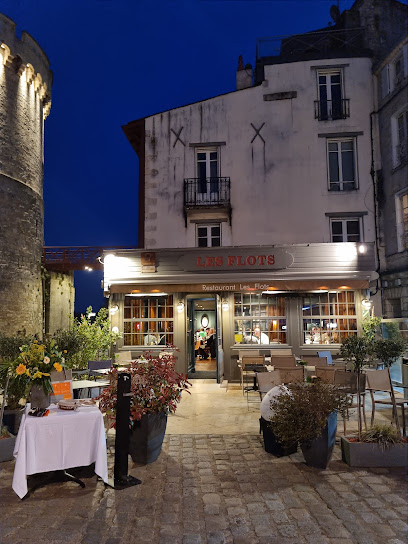
Le P'tit Amiral
Discover the exquisite blend of French and Creole cuisine at Le P'tit Amiral in La Rochelle – a culinary gem on the Atlantic coast.
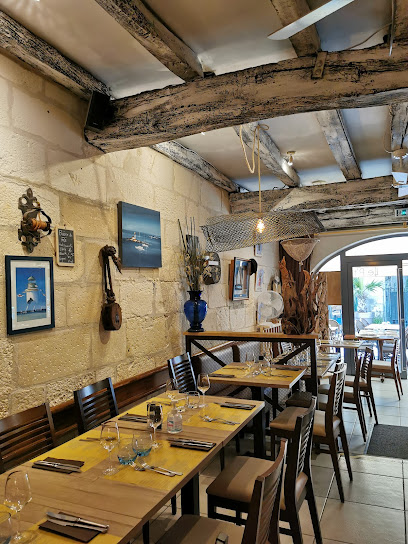
La Kase - Restaurant La Rochelle
Experience exquisite French cuisine with a modern twist at La Kase in La Rochelle—where tradition meets innovation.
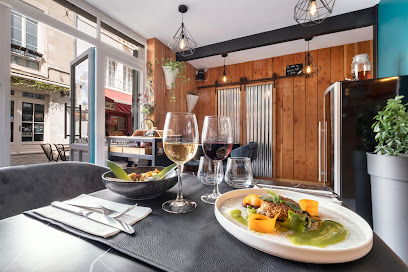
Saveurs Dans L'R
Discover the exquisite flavors of France at Saveurs Dans L'R in La Rochelle - where culinary artistry meets local charm.
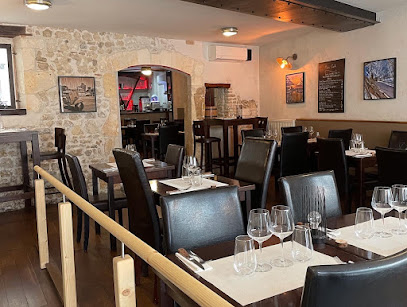
Prao Restaurant
Discover the flavors of France at Prao Restaurant in La Rochelle, where traditional cuisine meets modern elegance.
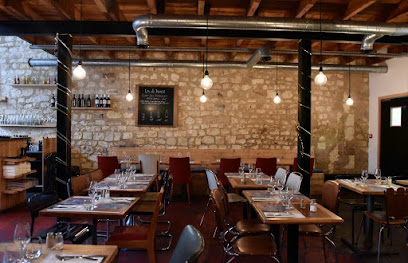
Le Comptoir Saoufé
Experience exquisite seafood at Le Comptoir Saoufé in La Rochelle - where fresh oysters meet French culinary excellence.
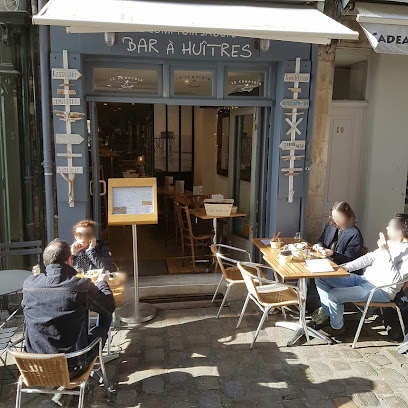
Markets, malls and hidden boutiques
Prao Boutique
Explore the rhythmic vibes and artistic flair at Prao Boutique, La Rochelle's premier record store and interior decor haven.
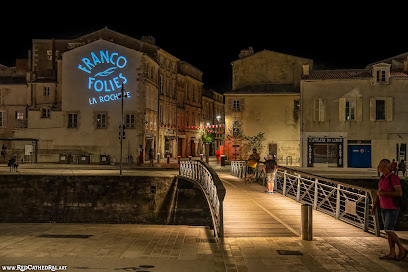
ETC...A
Discover unique gifts and local artistry at ETC...A, the charming boutique in La Rochelle offering a delightful shopping experience.
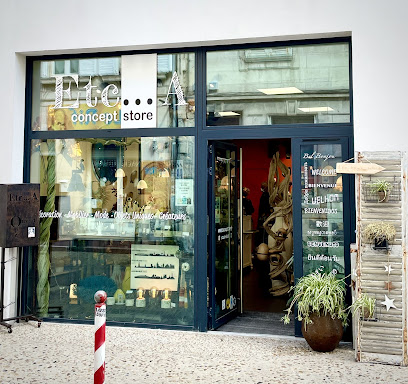
Cooper Spot Vintage
Explore the charm of vintage fashion at Cooper Spot Vintage in La Rochelle, where timeless style meets unique finds.
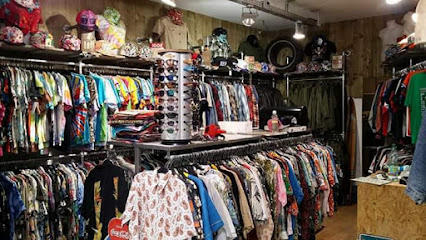
Audalisque
Discover unique local crafts and gifts at Audalisque, a charming store in the heart of La Rochelle that embodies the spirit of the region.
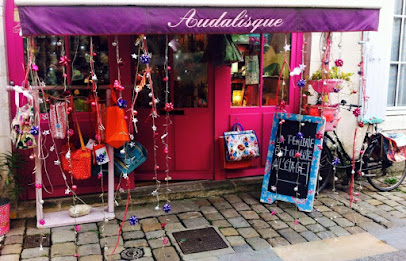
Kasbah Chic
Explore Kasbah Chic in La Rochelle for unique home goods and local artisan treasures that embody the charm of this beautiful French city.
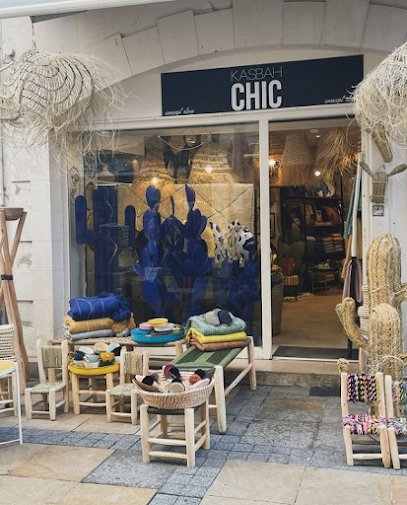
C. Fées Main
Explore C. Fées Main in La Rochelle for exquisite costume jewelry that captures the essence of French artistry and elegance.
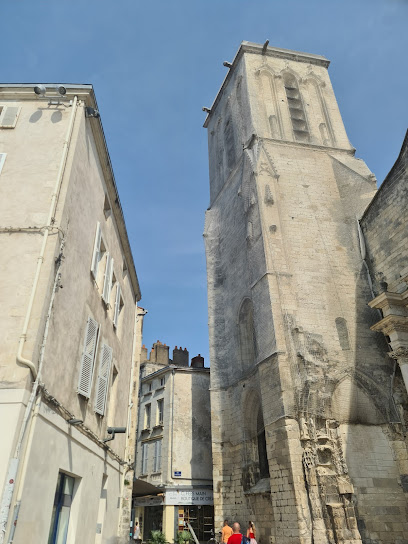
La Décochelle
Explore a treasure trove of unique gifts and local crafts at La Décochelle, your go-to gift shop in La Rochelle.
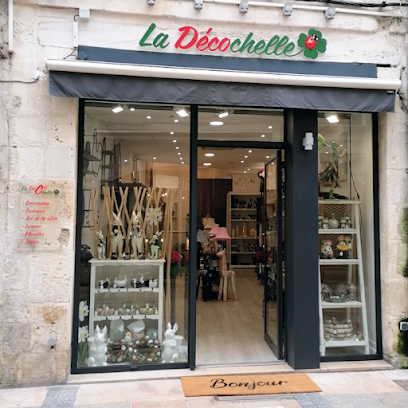
Sympa Boutique
Explore Sympa Boutique in La Rochelle: A treasure trove of unique gifts and local crafts for the discerning traveler.
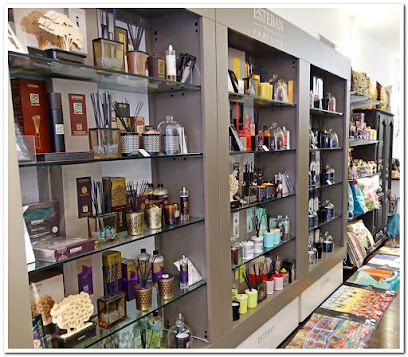
L'Océan
Discover unique souvenirs and local treasures at L'Océan, a charming gift shop in the heart of La Rochelle, perfect for every traveler.
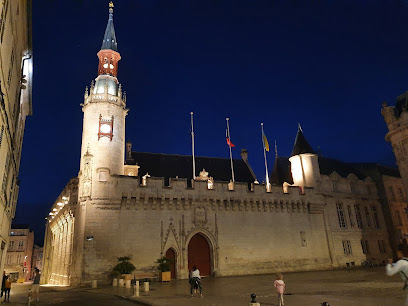
Boutiques
Explore the charming boutiques of La Rochelle, where fashion meets French elegance in a delightful shopping experience.
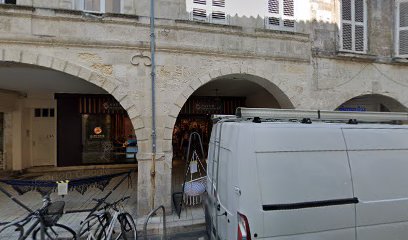
Essential bars & hidden hideouts
The Famous Pub
Discover The Famous Pub in La Rochelle, where vibrant atmosphere meets delicious food and drinks, perfect for tourists seeking a memorable experience.
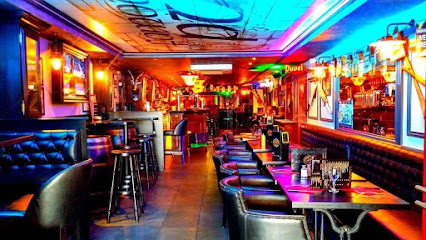
La Guignette
Experience La Guignette, La Rochelle's charming wine bar, known for its extensive wine selection and inviting atmosphere for all wine lovers.
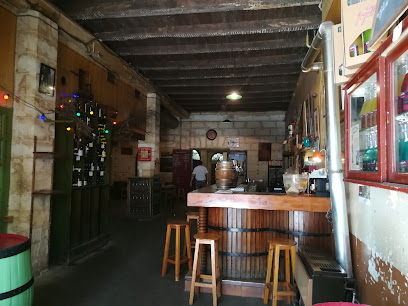
Chez Auguste
Discover the lively ambiance and extensive drink selection at Chez Auguste, La Rochelle's charming bar and pub experience.
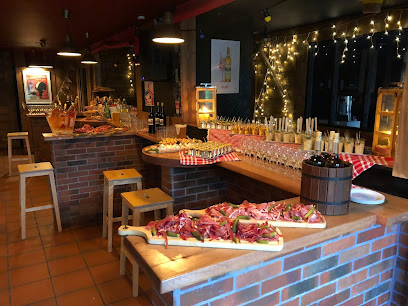
Pub Lutèce Brasserie
Experience authentic French cuisine at Pub Lutèce Brasserie in La Rochelle, where tradition meets modern flair in a cozy setting.
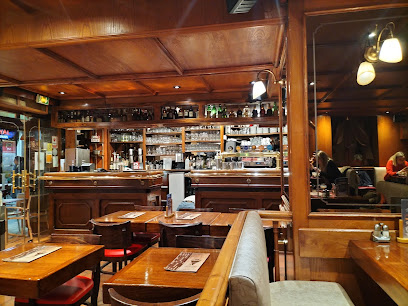
bad boys
Discover the lively energy of Bad Boys Lounge, a premier nightlife destination in La Rochelle, offering exceptional cocktails and a vibrant atmosphere.
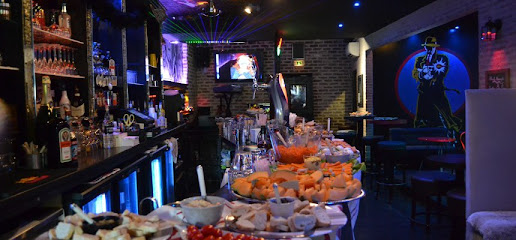
La Calhutte - Bar La Rochelle
Discover the lively spirit of La Rochelle at La Calhutte, where great drinks and friendly faces come together in a perfect blend.
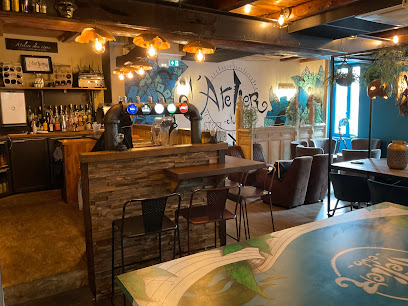
Bar Le Colt
Experience La Rochelle's vibrant nightlife at Bar Le Colt, where friendly service and a lively atmosphere await every visitor.
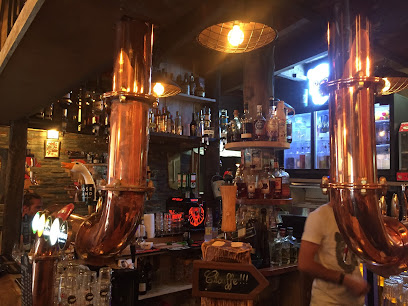
Le Troll Pub
Discover Le Troll Pub in La Rochelle – a vibrant bar and restaurant offering a cozy atmosphere, delectable dishes, and a fantastic selection of drinks.
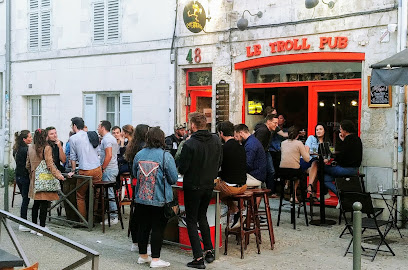
LE MAYFLOWER LA ROCHELLE
Unwind at Le Mayflower La Rochelle, where cocktails, live music, and vibrant nightlife create an unforgettable experience in the heart of the city.
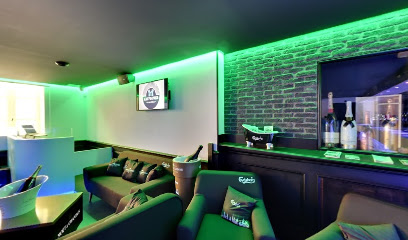
L’Abreuvoir
Experience the vibrant atmosphere at L’Abreuvoir, the perfect bar for enjoying exquisite drinks and socializing in the heart of La Rochelle.
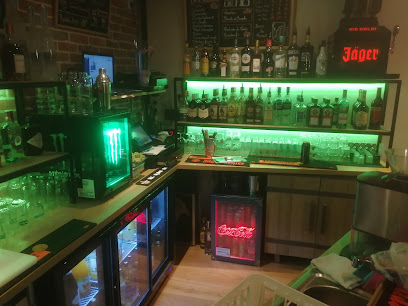
Local Phrases
-
- HelloBonjour
[bohn-zhoor] - GoodbyeAu revoir
[oh re-vwar] - YesOui
[wee] - NoNon
[nohn] - Please/You're welcomeS'il vous plaît / De rien
[see voo pleh / duh ryen] - Thank youMerci
[mehr-see] - Excuse me/SorryExcusez-moi / Désolé
[eks-kew-zay mwa / day-zoh-lay] - How are you?Comment ça va?
[koh-mohn sah vah?] - Fine. And you?Bien. Et vous?
[byen. ay voo?] - Do you speak English?Parlez-vous anglais?
[par-lay voo ahn-glay?] - I don't understandJe ne comprends pas
[zhuh nuh kohm-prahn pah]
- HelloBonjour
-
- I'd like to see the menu, pleaseJe voudrais voir la carte, s'il vous plaît
[zhuh voo-dray vwar lah kart, see voo pleh] - I don't eat meatJe ne mange pas de viande
[zhuh nuh mahnj pah duh vee-ahnd] - Cheers!Santé!
[sahn-tay] - I would like to pay, pleaseJe voudrais payer, s'il vous plaît
[zhuh voo-dray peh-yay, see voo pleh]
- I'd like to see the menu, pleaseJe voudrais voir la carte, s'il vous plaît
-
- Help!Au secours!
[oh suh-coor] - Go away!Allez-vous en!
[ah-lay voo zahn] - Call the Police!Appelez la police!
[ah-peh-lay lah poh-lees] - Call a doctor!Appelez un médecin!
[ah-peh-lay uh meh-deh-sahn] - I'm lostJe suis perdu
[zhuh swee pair-doo] - I'm illJe suis malade
[zhuh swee mah-lahd]
- Help!Au secours!
-
- I'd like to buy...Je voudrais acheter...
[zhuh voo-dray zah-shey...] - I'm just lookingJe regarde juste
[zhuh ruh-gard zhuhst] - How much is it?Combien ça coûte?
[kohm-byen sah koot?] - That's too expensiveC'est trop cher
[say troh shehr] - Can you lower the price?Pouvez-vous baisser le prix?
[poo-veh voo beh-say luh pree?]
- I'd like to buy...Je voudrais acheter...
-
- What time is it?Quelle heure est-il?
[kel ehr ay teel?] - It's one o'clockIl est une heure
[eel ay oon ehr] - Half past (10)Dix heures et demie
[dees ehr ay duh-mee] - MorningMatin
[mah-tahn] - AfternoonAprès-midi
[ah-preh mee-dee] - EveningSoir
[swahr] - YesterdayHier
[yehr] - TodayAujourd'hui
[oh-zhoor-dwee] - TomorrowDemain
[duh-mahn] - 1Un
[uhn] - 2Deux
[duh] - 3Trois
[twah] - 4Quatre
[kat] - 5Cinq
[sank] - 6Six
[sees] - 7Sept
[sept] - 8Huit
[weet] - 9Neuf
[nurf] - 10Dix
[dees]
- What time is it?Quelle heure est-il?
-
- Where's a/the...?Où est le/la...?
[oo ay luh/lah] - What's the address?Quelle est l'adresse?
[kel ay la-dress] - Can you show me (on the map)?Pouvez-vous me montrer (sur la carte)?
[poo-veh voo muh mohn-tray (soor lah kart)] - When's the next (bus)?Quand est le prochain (bus)?
[kahn ay luh proh-shahn (bus)] - A ticket (to ....)Un billet (pour ....)
[uhn bee-yay (poor)]
- Where's a/the...?Où est le/la...?
History of Saint-Sauveur
-
Saint-Sauveur, located within the historic port city of La Rochelle, has roots that trace back to the medieval period when the area served as an important maritime hub. The strategic coastal position allowed for the flourishing of trade and commerce, with local fishermen and merchants playing pivotal roles in the economic development of the region.
-
The neighbourhood is named after the Church of Saint-Sauveur, which was established in the 12th century. This church became a focal point for the local community, representing not only a place of worship but also a gathering point for social and cultural activities. The architecture reflects the Romanesque style typical of the era, showcasing intricate stonework and historical significance.
-
During the Wars of Religion in the 16th century, La Rochelle was a stronghold for Protestantism, with Saint-Sauveur at the heart of these tumultuous events. The neighbourhood witnessed significant conflict as Huguenots and Catholics vied for control, ultimately leading to the Siege of La Rochelle (1627-1628), which had lasting impacts on the city's demographics and cultural landscape.
-
In the 18th century, Saint-Sauveur thrived during the Age of Enlightenment when La Rochelle became a major trading port. The neighbourhood experienced economic growth due to its connection to the French colonies, particularly in the Americas. This period saw an influx of wealth and culture, influencing local architecture and lifestyle.
-
In recent decades, Saint-Sauveur has undergone a transformation, combining its historical roots with modern developments. The neighbourhood has embraced cultural revival, hosting events and festivals that celebrate its rich maritime heritage. The integration of contemporary art and gastronomy into the local scene reflects the dynamic spirit of La Rochelle, making Saint-Sauveur a vibrant area for both locals and tourists.
Saint-Sauveur Essentials
-
Saint-Sauveur is conveniently located in La Rochelle, easily accessible from other neighbourhoods. From the city center, you can walk to Saint-Sauveur in about 15 minutes. Alternatively, local buses (lines 1 and 3) provide regular services to this neighbourhood. The nearest train station is La Rochelle Ville, which is approximately 2 kilometers away; a taxi or a bike rental can help you reach Saint-Sauveur from there.
-
Saint-Sauveur is a compact neighbourhood, making it ideal for exploration on foot or by bicycle. Bicycles can be rented from various local shops. Public transport options include buses, which connect you to other parts of La Rochelle, and a nearby tram station. The local bike-sharing program, Yélo, allows you to effortlessly navigate the area while enjoying the scenery.
-
Saint-Sauveur is generally safe for tourists. However, it is wise to remain vigilant, especially in crowded areas. While there are no specific high-crime areas, petty theft can occur, particularly near tourist hotspots. Avoid poorly lit streets at night and keep your belongings secure. Always trust your instincts and seek help if you feel uncomfortable.
-
In case of an emergency, dial 112 for medical assistance, fire, or police. Local hospitals and clinics are equipped to handle emergencies, and pharmacies are readily available for minor health issues. It is advisable to have travel insurance that covers medical emergencies. If you need assistance, don’t hesitate to contact local authorities or your accommodation.
-
Fashion: Do dress comfortably and appropriately for the weather, especially during summer. Avoid overly casual attire when dining in nicer establishments. Religion: Do respect local customs, especially in places of worship where modest dress is encouraged. Public Transport: Do give up your seat for the elderly or those in need. Don’t eat or drink on public transport. Greetings: Do greet locals with a friendly 'Bonjour' or 'Bonsoir.' Don’t forget to use 'Merci' when someone helps you. Eating & Drinking: Do try local seafood and regional wines, and be open to trying new dishes. Don’t tip excessively; rounding up the bill is appreciated.
-
To experience Saint-Sauveur like a local, visit the local markets for fresh produce and artisan goods. Engage with shopkeepers and locals, as they are often willing to share recommendations about the best places to eat or visit. Don’t miss the chance to try the fresh seafood at local bistros or enjoy a picnic in one of the nearby parks. Attend local festivals if you can; they provide a great insight into the culture and community spirit.
Nearby Cities to Saint-Sauveur
-
Things To Do in Nantes
-
Things To Do in Angers
-
Things To Do in Bordeaux
-
Things To Do in Limoges
-
Things To Do in Tours
-
Things To Do in Rennes
-
Things To Do in Saint-Malo
-
Things To Do in San Sebastián
-
Things To Do in Caen
-
Things To Do in St. Clement
-
Things To Do in St. Helier
-
Things To Do in Gorey
-
Things To Do in St. Aubin
-
Things To Do in St. Brelade
-
Things To Do in St. Peter













